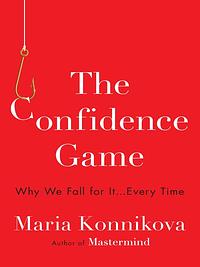Take a photo of a barcode or cover
This book is repetitive and slow. I’m incredibly fascinated by con artists, but the information presented here constituted a lengthy article rather than an entire volume. The conclusions that we are taken in because we prefer to be are interesting, but straightforward. There just isn’t this much to say.
Quite interesting to read about the cons and psychology behind it, but it felt like it was repeating itself over and over every page. Could have cut 120 or more pages out of it.
This sometimes read like a textbook but was nonetheless fascinating, and offered a combination of insights on our natural tendency to fall for the confidence game, no matter how intelligent or skeptical we count ourselves to be; and stories lifted from the past several generations of people whose experiences ran the gamut of lasting damage, mental and financial, from such scams.
Narration-wise, Konnikova was a good reader, except for one strange quirk: she has trouble with the "z" sound in "thousand." You never know how often that word is used (for dollar amounts, years, crowds of people or items of inventory) until you year "thouthand" for the zillionth time. The "z" in other words didn't seem to be a problem.
I wouldn't classify this as a true-crime book but it does reference a handful of true crime stories that fans will recognize. Definitely recommend for those curious about con artists and fans of such reads as My Friend Anna, etc.
Narration-wise, Konnikova was a good reader, except for one strange quirk: she has trouble with the "z" sound in "thousand." You never know how often that word is used (for dollar amounts, years, crowds of people or items of inventory) until you year "thouthand" for the zillionth time. The "z" in other words didn't seem to be a problem.
I wouldn't classify this as a true-crime book but it does reference a handful of true crime stories that fans will recognize. Definitely recommend for those curious about con artists and fans of such reads as My Friend Anna, etc.
I can't believe people got away with some of these scams.
Each chapter opens with the story of a famous con, then Konnikova takes us through each of the "stages" of the con, exploring cognitive theories of how such seemingly unbelievable tales can dupe even supposedly sophisticated marks. The stories were a mix of elaborate and simple cons, and were never dull.
I thought the whole thing was fascinating, and probably does the best job it can at inoculating you (even as it claims this is impossible, and offers supporting evidence which is frankly scary) via making you generally more suspicious of people in what's probably a good way.
A low 4.
Each chapter opens with the story of a famous con, then Konnikova takes us through each of the "stages" of the con, exploring cognitive theories of how such seemingly unbelievable tales can dupe even supposedly sophisticated marks. The stories were a mix of elaborate and simple cons, and were never dull.
I thought the whole thing was fascinating, and probably does the best job it can at inoculating you (even as it claims this is impossible, and offers supporting evidence which is frankly scary) via making you generally more suspicious of people in what's probably a good way.
A low 4.
After 30th page, I have no patience to go on. Best it's over.
Loved this book. I definitely came out of it thinking "Ha ha ha, well now that I know about confidence games, I would never actually fall for one," which is exactly what the author says that all of us believe about ourselves -- and that's why we fall for them.
Excellent and Scary! Well constructed story telling using the psychology and tools of her subject she creates suspense and anticipation, pulling the reader into the emotional rollercoaster. An excellent piece of work designed (hopefully, if one can override natural tendencies) to educate the unaware and gullible from the seduction of the game. Great examples well researched and supported by the numerous studies and reflections of contemporary academics and thinkers through history.
How this 300+ page book got published is a great mystery (or con) when a 5000 word article would suffice.
One would imagine an ethical publisher would regret and hang their head in shame at this gratuitous second hasty foray into book manuscript (or sorry excuse at a journalistic and pop-sci (pop-sci?) attempt of a book about scams, frauds and cons).
Given the author's PhD this book should not have lazily attempted to he like New Yorker's [a:Malcolm Gladwell|1439|Malcolm Gladwell|https://d.gr-assets.com/authors/1224601838p2/1439.jpg] [b:Blink: The Power of Thinking Without Thinking|40102|Blink The Power of Thinking Without Thinking|Malcolm Gladwell|https://d.gr-assets.com/books/1440763417s/40102.jpg|1180927] or [b:The Tipping Point: How Little Things Can Make a Big Difference|2612|The Tipping Point How Little Things Can Make a Big Difference|Malcolm Gladwell|https://d.gr-assets.com/books/1442270711s/2612.jpg|2124255]. Even those standard setting books had more diagrams and appeared academic by comparison.
One would imagine an ethical publisher would regret and hang their head in shame at this gratuitous second hasty foray into book manuscript (or sorry excuse at a journalistic and pop-sci (pop-sci?) attempt of a book about scams, frauds and cons).
Given the author's PhD this book should not have lazily attempted to he like New Yorker's [a:Malcolm Gladwell|1439|Malcolm Gladwell|https://d.gr-assets.com/authors/1224601838p2/1439.jpg] [b:Blink: The Power of Thinking Without Thinking|40102|Blink The Power of Thinking Without Thinking|Malcolm Gladwell|https://d.gr-assets.com/books/1440763417s/40102.jpg|1180927] or [b:The Tipping Point: How Little Things Can Make a Big Difference|2612|The Tipping Point How Little Things Can Make a Big Difference|Malcolm Gladwell|https://d.gr-assets.com/books/1442270711s/2612.jpg|2124255]. Even those standard setting books had more diagrams and appeared academic by comparison.
amazing and thought provoking insights. how many times have i been duped and didn't even know it?...



